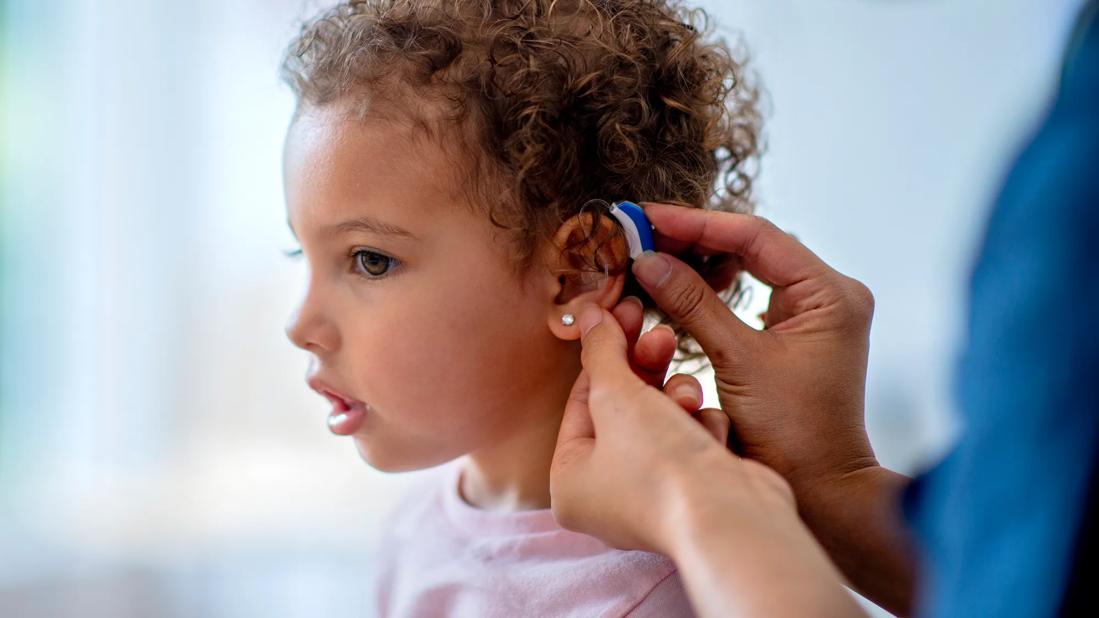A systematic review indicates children with HI perform worse on IQ tests than their normal hearing peers, but more research is necessary to fully understand the impact of hearing loss on neurocognitive domains

Image content: This image is available to view online.
View image online (https://assets.clevelandclinic.org/transform/7f38d4dd-805b-4c55-b05c-d7011028021d/child-hearing-aid-2160289598-r)
child with hearing aid
Hearing loss affects two to three out of 1000 children born in the United States, and hearing impairment has been shown to cause many harmful effects on children including speech and language delays, behavioral concerns, and difficulties in educational settings. Neurocognitive testing and intelligence quotient (IQ) assessments have been shown to be closely related to academic performance in students, but these tests have many unique challenges for children with HI. As a result, misconceptions exist that suggest that children with HI have lower IQs than their normal hearing (NH) peers.
Advertisement
Cleveland Clinic is a non-profit academic medical center. Advertising on our site helps support our mission. We do not endorse non-Cleveland Clinic products or services. Policy
In recent years, a better understanding of the neurocognitive principles and neurodevelopmental alterations related to learning and language acquisition has led to improved accuracy and validity of testing. A presentation from the 2022 American Academy of Otolaryngology – Head and Neck Surgery Annual Meeting, reviewed current literature to evaluate the impact of hearing loss on intelligence quotient (IQ) scores in pediatric patients.
“We looked at all the studies published so far on neurocognitive testing in children with hearing loss. Studies used different tests based on the patient’s age, cognitive functioning, and other considerations” says Samantha Anne, MD, the Medical Director of Pediatric Ear and Hearing Disorders at Cleveland Clinic and the corresponding author of the study. “It’s a significant amount of information out there, and the point of the study was to synthesize everything to try to come up with an overarching theme to what we think is happening with these children with hearing loss.”
The literature search identified 3199 studies that evaluated neurocognitive testing and hearing loss in children aged 21 years old or younger who had not undergone auditory rehabilitation. Of those studies, 431 underwent full-text screening, and 21 studies were ultimately selected for inclusion. These studies contained a total of 1716 pediatric patients assessed through 13 different validated tests of intelligence. Six of the studies included both patients with HI, patients with NH and IQ test results. Three of those studies included full-scale IQ (FSIQ) assessment and were included in meta-analysis. These three studies included 74 children with HI and 70 children with NH. The meta-analysis found that children with HI are performing almost eight points (7.7 points [95% CI = -12.0 to -3.4, p = 0.0005]) worse on their IQ testing in comparison to the children with NH.
Advertisement
Dr. Anne explains, “The decreased scores in children with HL are important to recognize but there are questions that still remain on what other factors could be contributing to these decreased scores. We still don’t know the full extent of the impact of educational support, family support, a child’s comorbidities, and other variables that can all influence the results. The way we manage these children is changing over time. We used to think that if they had mild hearing loss or one-sided hearing loss, they’ll be fine. Clinicians in the past took much more passive approaches like encouraging them to sit in the front of the classroom and have the teacher talk a little louder. Now, we realize that’s simply not enough and the way we’re managing these patients is definitely evolving. But we still need more information. We’re noticing that even children with mild hearing loss may need additional services and support to help them optimize their outcomes. So, that was one of the difficulties in looking at all the literature that’s been published already because we haven’t always done things the way we do it now. And it’s going to even change further over the next few years.”
Dr. Anne is presently working on other studies to help advance care for these patients. One of the studies is exploring whether hearing aids, implants, or other kinds of hearing rehabilitation corrects some of these neurocognitive deficits as well as what impact timing has in regard to treatment. The other study is another systematic review that looks at what other studies have found in terms of how children with hearing devices do neurocognitive testing.
Advertisement
Dr. Anne notes that it’s important for future studies to focus on determining what variables can improve results with auditory rehab. “This isn’t just about fitting a child with a hearing aid or cochlear implant and calling it a day,” she says. “There is so much complexity to how many variables affect how these patients do with the devices. The goal is to eventually understand what optimizes these patients in whichever clinical scenarios they present in. We want to look beyond simple auditory rehabilitation, and really take into account the individual characteristics of these patients —family dynamics, school situations and many other factors. We want to be able to maximize these patients’ outcomes no matter what background they come from.”
Advertisement
Advertisement
Analysis of HNSCC patients shows HPV status to be predictive of higher abundance of oncobacteria within the tumor
Case study illustrates the potential of a dual-subspecialist approach
Evidence-based recommendations for balancing cancer control with quality of life
Study shows no negative impact for individuals with better contralateral ear performance
HNS device offers new solution for those struggling with CPAP
Patient with cerebral palsy undergoes life-saving tumor resection
Specialists are increasingly relying on otolaryngologists for evaluation and treatment of the complex condition
Detailed surgical process uncovers extensive middle ear damage causing severe pain and pressure.